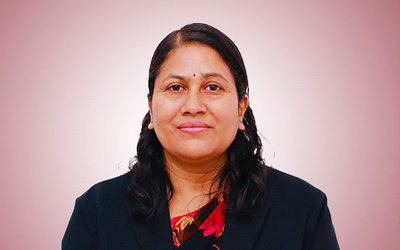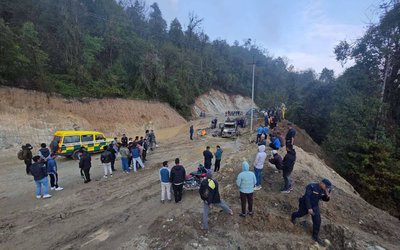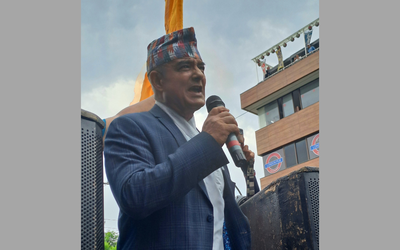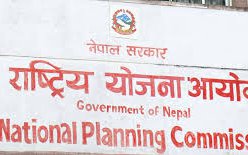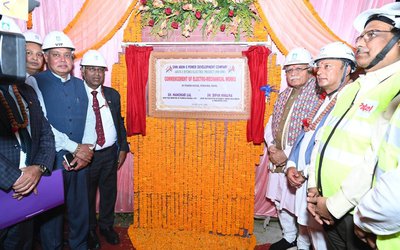
A group of Nepalese children launched a report After the Earthquake Nepal’s Children Speak Out, Nepal Children’s Earthquake Recovery Consultation Report Saturday amid a function.
Along with a short video screening about the children consultation process, government officials, representatives of development partners and other civil society members also participated in the discussion program.
Organized jointly by Plan International, Safe the Children, Unicef and World Vision in collaboration with Ministry of Federal Affairs and Local Development and Central Child Welfare Board, speakers stressed the need to listen the voices of children.
According a press release, in one of the largest ever child consultations undertaken following a disaster, nearly 2,000 children who survived the earthquakes in Nepal have expressed fear and insecurity at having to live in tents and overcrowded shelters, anxiety about the risks to their health from unsanitary conditions, and worry about their future if they cannot return to school.
The aid organizations that carried out the consultations– Plan International, Save the Children, UNICEF and World Vision – highlight the need to strengthen the resilience of communities against major disasters. They also warn of severe risks to children’s health, well-being and protection during the monsoon season unless urgent humanitarian needs are met.
In the research released today, children shared their top priorities as adequate shelter, to be able to return to school and to have access to safe water supplies, sanitation and health care. After the earthquake: Nepal’s children speak out reveals the deep fears and anxieties of children, who are among the hundreds of thousands of people whose homes, were destroyed.
Girls and boys described the difficulties of living in temporary shelters that were neither water or wind-proof in the aftermath of the earthquakes.
“Our shelter is at high risk of heavy storms. We were forced to stay awake for a whole night to hold on to the tarpaulins to save them from blowing away,” said a young boy in Nuwakot, one of the 14 most affected districts where children were consulted.
Save the Children’s Humanitarian Advisor and author of the report, Lucia Withers said: “Tens of thousands of children are living in inadequate shelters. Despite efforts to help earthquake-affected communities, it is still a race against time to provide basic needs of shelter, sanitation and protection."
Children expressed concern about the lack of privacy and space, with some younger children fearing attacks of wild animals. Girls in particular reported feeling vulnerable in shelters shared with extended families and neighbors, while others felt subjected to sexual harassment and feared an increase in trafficking.
“Living under the sky increases our exposure to abuse,” said an adolescent girl from Sindhupalchowk – a district hit by the earthquakes.
World Vision’s Nepal Earthquake Response Operations Manager Admir Bajrami said, “With the monsoon season intensifying, we must act quickly and effectively to ensure the welfare of earthquake-affected children and their families is addressed. Children have lived through a hugely distressing experience which has also disrupted their education and they urgently need psychosocial support to recover.”
Children who took part in the consultation provided detailed and practical recommendations on how to rebuild their lives and communities, including the need for earthquake-resistant homes, schools and other buildings. Children also want to be better prepared for future earthquakes.
“I want to see earthquake-resistant houses built in flat areas with trees planted,” said a teenage boy from Sindhupalchowk.
Children suggested that schools be run in tents or other temporary shelters until new schools have been built and called upon the government to replace the books, stationery and other school materials that were buried under the rubble of their homes.
Furthermore, they called for stronger protection for themselves and other children in their communities.
Plan International’s Head of Disaster Preparedness and Response, Dr. Unni Krishnan said: “Children’s lives in earthquake-affected areas have been turned upside down. The world must wake up to the fact that it is absolutely critical that children are factored in for any disaster preparedness and response efforts to be successful.”
Despite the huge challenges faced by the earthquake survivors, children also talked of communities rallying to help each other. In the consultation, children showed remarkable levels of resilience and optimism highlighting that their lives would normalize and even improve through the support of their communities.
UNICEF Deputy Representative Dr. Rownak Khan said: “These children have provided us with valuable insights that could have been missed by adult eyes. These suggestions now need to guide our programs in the rest of the country, to better prepare all communities in Nepal for impending disasters.”
At the end of May and early June 2015, 1,838 children were consulted in the 14 districts most affected by the earthquakes on 25 April and 12 May 2015.
The consultation was carried out in collaboration with the Government of Nepal’s Ministry of Federal Affairs and Local Development and Central Child Welfare Board. According a press release, the consultation provided valuable input for the Government of Nepal’s Post Disaster Needs Assessment (PDNA).
- NEPAL-THAILAND: Joint Business Council
- Apr 13, 2025
- BIMSTEC SUMMIT: Nepal’s Stand
- Apr 11, 2025
- IME GROUP: Expands Into Paper Industry
- Mar 24, 2025
- CPN UML: Instigated By India
- Mar 23, 2025
- ADB’S CHIEF ECONOMIST: Nepal Reduces Poverty
- Mar 11, 2025


